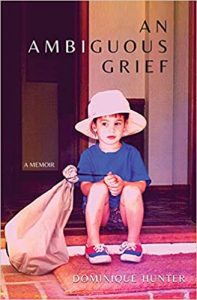EXCERPT OF AN AMBIGUOUS GRIEF

SAMSUNG DIGITAL CAMERA
Dominique Hunter experienced one of the greatest tragedies most mothers can imagine: the death of a child. Her son Dylan died as a young man, having suffered for many years with debilitating anxiety, OCD, and ADD. In An Ambiguous Grief, she reckons with her loss by engaging in conversation with Dylan and employing the most flexible tool in the nonfiction writer’s toolbox: speculation. With the tender and heartfelt devastation of David Sheff’s Beautiful Boy, Hunter’s debut memoir will speak to anyone who has been touched by mental illness, to those who are grieving, and to those who have yet to feel seen or heard. An Ambiguous Grief is more than a memoir; it is one mother’s testimony.
EXCERPT
In bed at night, as sleep eludes me, I often have a song circling in my head, one of the French yeah!yeah! songs from my youth that seems to come out of nowhere. It must have tucked itself so deeply into my psyche that it only pops out in the vacuum left by my insomnia.
It wouldn’t be unpleasant if the song wasn’t running on a loop and if I was able to stop it. But no matter what I do, it keeps going. I try to pry my mind off it by focusing on something else, something tangible and dear to me, like what new plants I will get in the spring for the garden or our trip to France in the summer – shall it be in the Dordogne or Provence? Shall we skip Paris? I think about the book I am reading or about the meal I will cook on Sunday for your brother who comes every Sunday to be with us since you left.
I think about everything I can think of, but the damn song remains in the background like a soundtrack to my thoughts, and it drives me crazy.
I think of you, then. I think of how your own obsessive thoughts seared your mind with the fear that Glenn or I could die, that one of us had cancer and was hiding it, and the anxiety that followed was so powerful you had to perform your rituals. At home by closing and opening doors, taking a few steps this way and that, going outside to tap-tap-tap on the wall with two knuckles, rhythmically and with a pattern: Three knocks and stop, three knocks and stop, then five knocks and stop. Again. Three knocks and stop, three knocks and stop, then five knocks and stop. If ever a third knuckle touched the wall, you had to start all over. Three knocks and stop, three knocks and stop, and then five knocks. At school by tapping quietly under your desk with the rubber end of a pencil – tap-tap-tap, tap-tap-tap, tap-tap-tap.
I see now how absolutely mad it was, like being unable to turn off a faucet all the way, and being forever condemned to hear the drip, drip, drip of water inside the pipes of your brain.
No wonder you needed drugs. No wonder you went out and found them! Who could blame you?
You did! Glenn did! Adrian did! You all did!
Of course, we did. You were our son! You were his brother! It was so very raw and personal and complicated, don’t you see? How could we allow ourselves to agree to your choice of relief, which was a complete shutdown of your mind? It was maddening, and there were so little choices. Cigarettes? I fought Glenn to let you smoke…
Outside the house, off our property, out on the street!
…thinking it was a minor health scare compared to the alternative. And yes, outside on the street. Of course, outside on the street! Not that it helped any.
It helped me stop chewing my fingernails for a while, but that wasn’t enough. Nothing was enough. Not even the weed Glenn gave me.
You called it hippie weed because it was so mild. Meanwhile, what you smoked didn’t just get you high, it got you wasted.
That was the idea, Mom.
And you went right back to chewing your fingernails, down to the quick.
You called me chewy! Chewy or stumpy!
You called me wrinkly!
Only fair.
Let’s high five that!
—
*PLEASE NOTE THAT ALL PROCEEDS OF THIS BOOK WILL BE DONATED TO THE BRAIN AND BEHAVIOR RESEARCH FOUNDATION.
About Dominique Hunter
Dominique Hunter was born and raised in the Languedoc, a region in the south of France. In 1979, she moved to Berkeley, California. She married an American and had two sons. She loves animals, American Jazz and the cello. She resides in Oakland with her husband and Babette, her sassy Aussie.
Related Links
Amazon: https://www.amazon.com/Ambiguous-Grief-Dominique-Hunter/dp/1649218818/
Indiebound: https://www.indiebound.org/book/9781649218810
Goodreads: https://www.goodreads.com/book/show/54025527-an-ambiguous-grief
Brain and Behavior Research Foundation: https://www.bbrfoundation.org
100% of this book’s proceeds are benefitting the Brain and Behavior Research Foundation (BBR Foundation), a global nonprofit organization focused on improving the understanding, prevention, and treatment of psychiatric and mental illnesses. Learn more here: https://www.
About the Book
AN AMBIGUOUS GRIEF: A MEMOIR (Atmosphere Press, September 15, 2020)
 “An Ambiguous Grief is a beautiful, unflinchingly honest, poignant and wistful memoir, written with humor, and a graceful sangfroid that is admirable. One thing Dominique Hunter has done extremely well is to reveal her son Dylan’s story in the exact right way: readers know upfront that she has lost him, but they don’t know how. By the time we find out what happened to him, we know enough about his struggles and hers to understand how he came to that point in his life.
“An Ambiguous Grief is a beautiful, unflinchingly honest, poignant and wistful memoir, written with humor, and a graceful sangfroid that is admirable. One thing Dominique Hunter has done extremely well is to reveal her son Dylan’s story in the exact right way: readers know upfront that she has lost him, but they don’t know how. By the time we find out what happened to him, we know enough about his struggles and hers to understand how he came to that point in his life.
Although the story is about Dylan, in the end, it tells the story of a mother’s journey through coping with a devastating loss and moving forward – not “getting over it,” but facing it by using her intelligence, humor, honesty, and humanity to deal with it in all its messy, sad, loving, ironic, despairing, hopeful, ambivalent ways. And to survive that journey, she takes us into an imaginative realm where past, present and future align to give her the space to heal.”
– Susan Edwards, Editor, Florida
“A brave and beautiful memoir. The author managed to write an engaging, not-depressing book about surely the most painful and depressing experience a mother could ever have. She gives us an affectionate and realistic portrait of her son, and indeed of herself, that is full of love, and its effect on the reader is to make life feel precious and rich, and to encourage us to love hard the people we love, who will someday be gone from us one way or another, without either sentimentality or didacticism. It would have been so easy, and understandable, for this book to be nearly unbearable to read, too personal for an outsider to connect to, a manifestation of despair. It isn’t. It is deceptively ‘light’, and full of light. That is quite an accomplishment.”
– Lisa Kaufman, Editor, NYC
Category: On Writing























